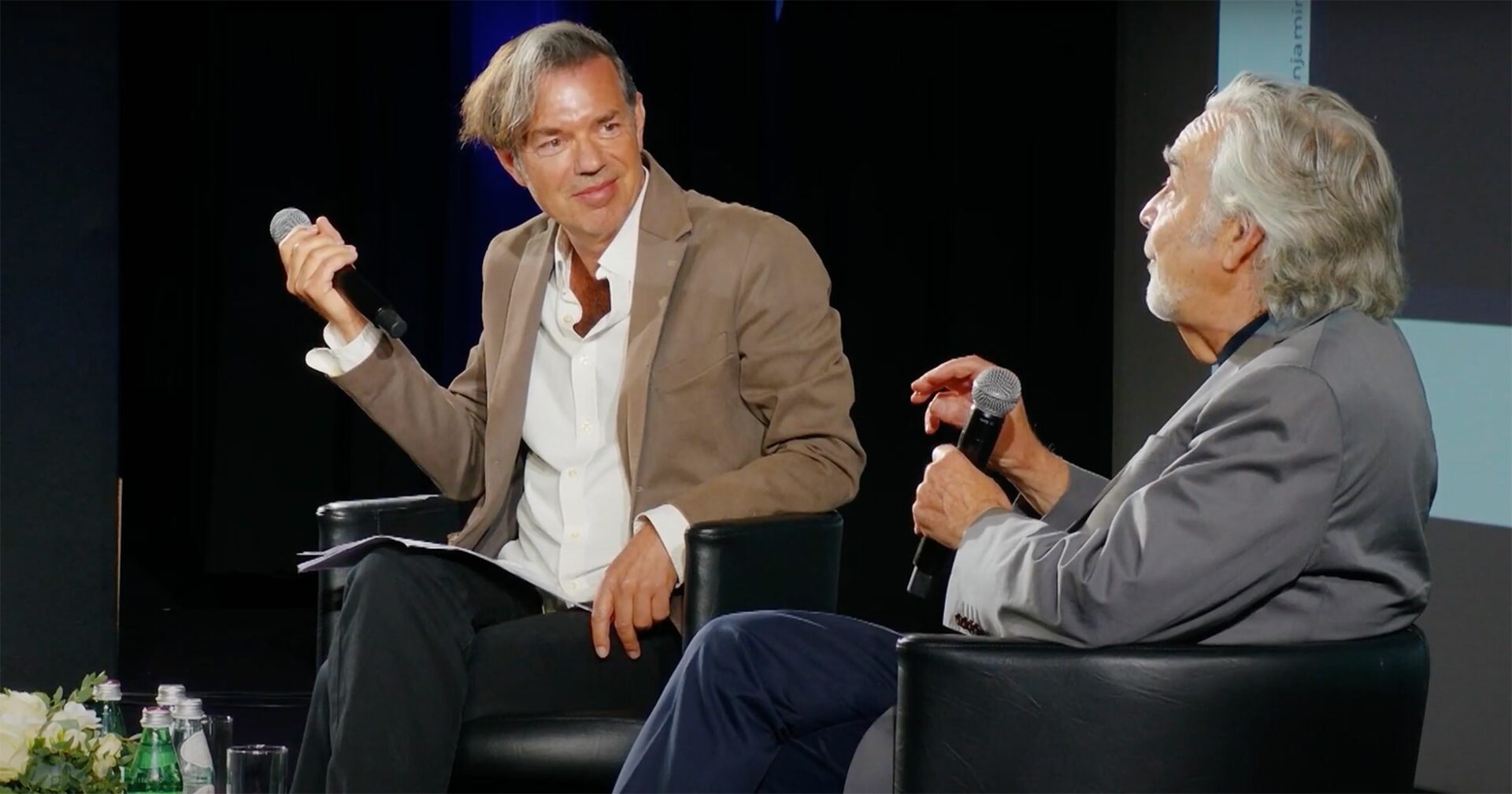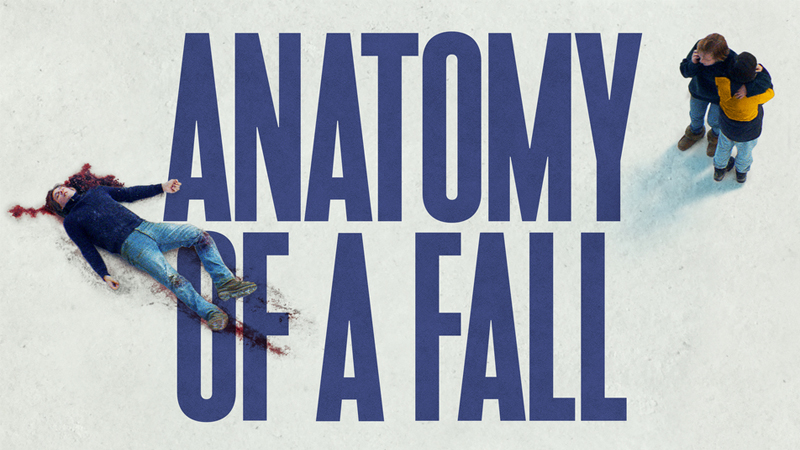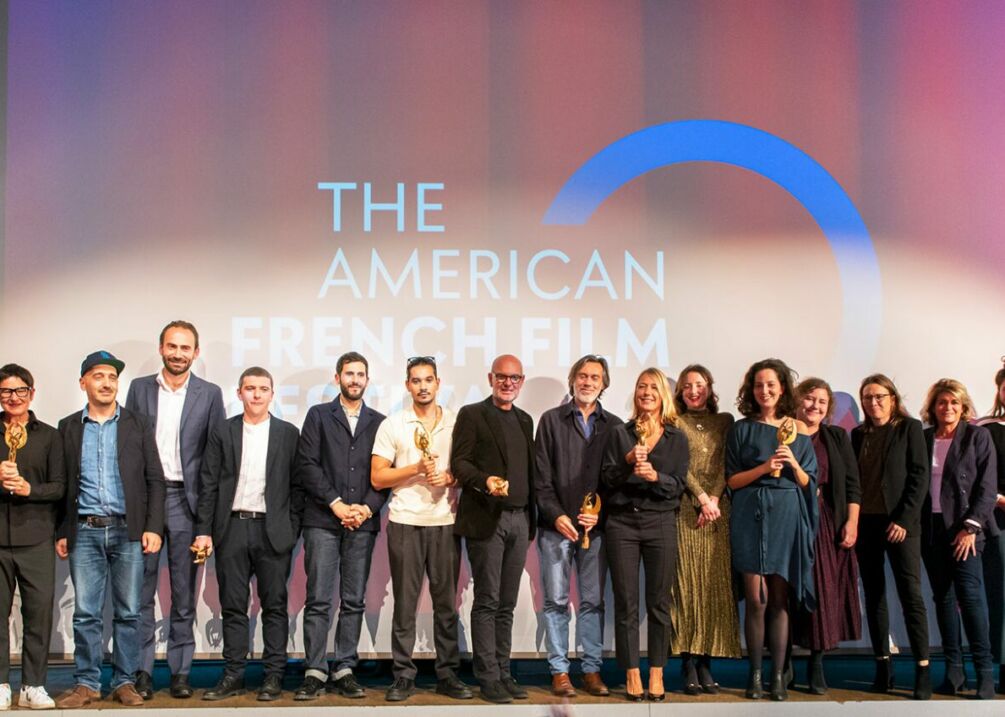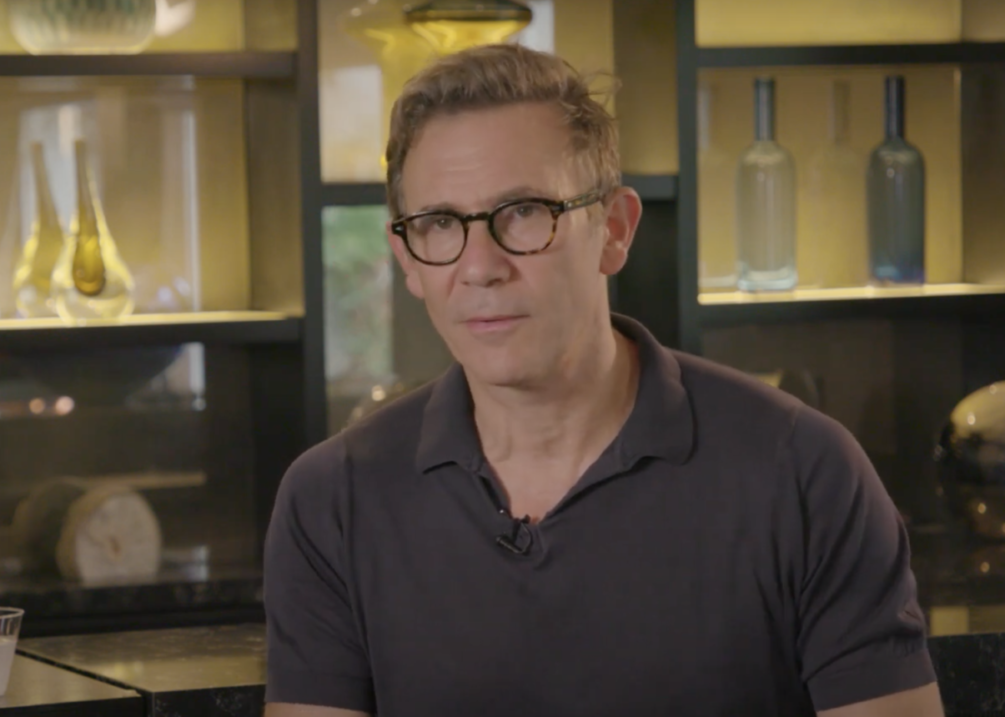Take away a film’s soundtrack and it’s never the same. Stéphane Lerouge won’t tell you otherwise. An undisputed reference in musicology, a master of soundtracks, an expert in musical excavations and archives… do we really need to introduce him? This passionate man pays tribute to film composers, and through them, shows us how to hear and listen to music in cinema. At the recent Cannes Film Festival, he hosted La leçon de musique, organized by Sacem, with Howard Shore and Martin Scorsese. For the first time, these two great names in cinema discuss their collaboration. Stéphane Lerouge looks back on this encounter.
Célyne df Mazieres. What was the starting point for your specialization, which has earned you a reputation as the archaeologist or “Colombo” of film soundtracks?
Stéphane Lerouge. The frustration that, at the crossroads between vinyl and CD in the early 90s, a whole section of cinema’s musical memory could no longer be heard on record. Released at the time of the films’ release, the original vinyl records had become the Grails of the LP. For example, when films such as Plein soleil, Pierrot le fou, L’Affaire Thomas Crown, L’Armée des ombres and Coup de torchon were broadcast on television, the demand for their music could no longer be met. In short, the film music of the 60s and 70s was a sunken continent. There was a memory to be reinvented and reactivated. I began this reissue work with independent labels, before Daniel Richard of Universal Music entrusted me with the creation of a collection called Ecoutez le cinéma! which today includes over 200 references.
CDFM. To understand the importance of music in cinema, what do you think makes an exceptional soundtrack?
S.L. An excellent soundtrack walks a tightrope, serving the film as much as the music, the director’s message as much as the composer’s own ambitions. The proof: whatever the filmmaker or the genre to which the film belongs, you need two bars to identify Michel Legrand, Georges Delerue, Francis Lai, Ennio Morricone, Gabriel Yared, Alexandre Desplat or Bruno Coulais. Through the universe of another creator, the director, they know how to find the right way to impose their voice.
I tend to prefer creation to recycling, and made-to-measure to ready-to-wear.
Hence the interest of the Sacem Music Lesson at the Cannes Festival, which highlights the composer’s contribution.
CDFM. Would we detect themes or sequences just as well without the contribution of music? In other words, does music help us understand a film?
S.L. Music is the view, the subjectivity, the interpretation of one creator, the composer, on the work of another creator, the filmmaker. At the post-production stage, the filmmaker is sometimes at a loss, lacking perspective on the film. And it’s precisely the composer who often brings a fresh eye to the job, helping him to gain some distance. At Cannes 2022, Coulais recounted how touched he was when a filmmaker told him: “Your music helped me see an aspect of my film of which I was unaware.” So, yes, music helps us to understand a film; it’s an additional layer of meaning, and therefore of direction. A film is also written by its score.
CDFM. Among your favorite soundtracks, name 3 films in which the music transcends images and scenes to the point of carrying the film and becoming one.
S.L. Michel Legrand once told me this truism: “When the music of a film is successful and just right, you can no longer imagine the film with any other music.” In other words, what is not obvious a priori becomes obvious a posteriori. Let’s take Peau d’âne, The Talented Mr. Ripley or The Shape of Water as examples: three scores that bring an additional state, a dimension not contained in the image… and three scores taken at random from among my 300 bedside soundtracks!
CDFM. Do you think that a soundtrack can enhance a film to the point of sublimity? Or, on the contrary, detract from it …
S.L. Morricone has penned countless scores for genre films (gialli, erotica) in which his genius has been total. Some even believe that he was more ambitious, more experimental, even freer in this context than on so-called “prestige” productions. In the same way, Claude Bolling’s score for Borsalino and François de Roubaix’s for La Scoumoune far surpass the films themselves, with their dull, formatted stagings. Today, what spoils many films is abusive synchronization, i.e. the purchase of pre-existing titles. Too many filmmakers tend to mechanically apply their Spotify or Deezer playlists to their images… in the naive belief that it will work. In itself, there’s nothing wrong with the process. The tragedy is that it’s tending to become the norm. Personally, I’d tend to prefer creation to recycling, made-to-measure to ready-to-wear. Hence the interest of the Sacem Music Lesson at the Cannes Festival, which highlights the composer’s contribution.
CDFM. Which of your archaeological digs have given you the most trouble when it comes to re-editing, even if it meant devoting all your time to getting it right?
S.L. I wouldn’t want to go into too much detail… But I could mention the work sessions between Legrand and Demy on Les Demoiselles de Rochefort, recorded on little Philips audio cassettes. In Maurice Jarre’s archives, it was mind-boggling to listen to his spotting sessions at the editing table with his filmmakers after his death. At the time of to be able, if necessary, to listen to the director’s indications. So he recorded everything! In a shoebox on the top shelf of his office, there were dozens of cassettes of Maurice talking to John Huston, Hitchcock and Eastwood. We should also mention the discovery of music composed by Michel Legrand for Le Cercle rouge or La Rose et le flèche, and eventually replaced, and Georges Delerue’s demos for Tati’s Playtime… Finally, we should mention Jean-Claude Vannier-Gainsbourg, with the music for Les Chemins de Katmandou, one of the highlights of the duo’s career, sandwiched between La Horse and Melody Nelson. The only surviving tape had been forgotten in a suitcase, at the top of a cupboard, at the home of Vannier’s former copyist… It was discovered in extremis, five days before the 5-CD box set Le Cinéma de Serge Gainsbourg was due to go into production.
CDFM. At the last Cannes Film Festival, the masterclass La leçon de musique was devoted to the musical work of Howard Shore. This giant of soundtracks says he got into the business by chance. How do you explain his ability to capture the content and meaning of a film or scene through his compositions?
S.L. Because he knows perfectly well how to listen to the film and its director. He’s perfectly aware that even before composing, the first job is to give birth to the filmmaker, to make him talk, almost like an analyst. What the director doesn’t express is almost as important as what he does express. Howard objectively possesses this gift. That said, at the Cannes Music Lesson in 2021, Bruno Coulais asserted, with a touch of second degree: “More often than not, disobeying the director is the best way to be faithful to him.”
CDFM. When you were asked to conduct a masterclass with Howard Shore and Martin Scorsese, what was the first question you spontaneously thought of?
S.L. They are two sacred monsters, and above all, this was the first time they had been brought together for a two-voice meeting, devoted to their long-term collaboration, spanning more than 25 years. So I wanted to ask Scorsese what parameters, depending on the project, made him choose either pre-existing works or original music, in this case with Howard. Why did he feel the need to create an original score for Gangs of New York or The Aviator... but not for Shutter Island?
CDFM. What major themes did you want to highlight for this 2023 masterclass, and why?
S.L. First of all, I wanted to reveal this paradox: resistant to formatting, Shore avoids the pitfalls of an illustrative and descriptive aesthetic, which makes him the antithesis of the Hollywood composer. And yet, he proves Hollywood-compatible when circumstances demand it. We saw this with the great H1 test flight sequence in The Aviator. Listen to the music alone: you can’t tell from the picture. Watch the scene with the sound off: you can’t imagine what Howard’s music sounds like. But, as in a chemical formula, the two elements combine to form a third, which surpasses the first two. Scorsese himself was blown away when he rediscovered the musical treatment of this sequence. And Shore had this beautiful closing line:
“Cinema is a collective art: the work born of composer-cinematographer collaboration is greater, more vast than any individual.”
CDFM. From their gigantic filmography, how do you choose a song, a piece of music, a theme? composition more than any other, how do you make your selection?
S.L. To tell the truth, the selection of film extracts was a headache: it would have taken three Music Lessons to reflect all the territories of the Shore continent, all its different sides and faces. So I made a “broad” selection, which Howard then boiled down to his own requirements, such as opening with an excerpt from his latest Cronenberg film, Future Crimes. The sequence in question (an organ amputation operation turned spectacle) was pretty radical. I tried to warn Howard:
“Careful, it might shock the public!” With his dry sense of humor, he replied, “So much the better!” I was also keen to include an extract from Esther Kahn, as Arnaud Desplechin recorded a moving video testimonial for us about his Shorian companionship. Finally, Scorsese immediately approved the 3 extracts concerning him. We knew that, in conclusion, the virtuoso opening of Hugo Cabret would lift the audience… as the music makes a magical transition from one scale to another, from an aerial shot of snow-covered Paris… to a close-up of the venerable Georges Méliès played by Ben Kingsley. Indeed, the hoped-for standing ovation did indeed take place.
I tend to prefer creation to recycling, and made-to-measure to ready-to-wear.
Hence the interest of the Sacem Music Lesson at the Cannes Festival, which highlights the composer’s contribution.
CDFM. What does Howard Shore bring to Martin Scorsese’s filmography?
S.L. It’s an objective, if not clinical, observation: Shore is the composer who has done the most music writing for Scorsese. I think that Howard’s personality, his mixture of gentleness and obstinacy, is very reassuring to Scorsese. There’s an aesthetic Grand Canyon between the score of After Hours, which is entirely electronic, and that of The Aviator, conceived for symphony orchestra, where the influence of Bach and Spanish folklore can be felt. Or The Infiltrated, with its sharp tango written for a quartet of acoustic guitars. No two Shore scores for Scorsese are alike.
CDFM. If you had to choose 3 Howard Shore compositions as a whole, which would they be? and why?
S.L. Howard often says: “You have to learn to build a relationship of trust with the filmmaker, so that he encourages you to express yourself in a personal, singular, ambitious way.” With this ambition in mind, how can we forget Ornette Coleman’s free saxophone, the inner cry of The Naked Feast, the haunting electric guitar sextet of Crash, the instrumental equivalent of magmas of metal and flesh… or Ed Wood, an “outlandish” soundtrack for solo theremin set to Afro-Cuban rhythms? For each of these 3 projects, Shore has created original orchestral meccanos that are a little crazy and specific to each project.
CDFM. In your opinion, can a composer match or adapt to any type of film?
S.L. It depends on the films… and especially on the composers. Often, a composer’s successes lock him into a supposed job. They’re stuck with an image that doesn’t necessarily correspond to the real range of their abilities. To stay with Shore, the “Lord of the Rings / Cronenberg / Scorsese” image sometimes makes us forget that he is also the composer of Mrs Doubtfire! Some people love to regenerate their creativity by working on opposite projects, as if each film were a recreation of the one before and the one after, as if they needed to breathe different oxygen in alternation: Michel Legrand composed for Agnès Varda as well as for Sean Connery’s latest James Bond film, Philippe Sarde for Jacques Doillon and Georges Lautner, Gabriel Yared for Godard and Jean-Pierre Mocky, Alexandre Desplat for Raymond Depardon and Godzilla…
CDFM. What is it about the duo of Martin Scorsese and Howard Shore, the music and work just as well together?
S.L. Their balance also lies in their complementarity: Howard is a cinephile, Scorsese a music lover. Another parameter: these 2 lively, inquisitive minds are only 4 years apart. One in Toronto, the other in New York, they lived through the earthquake of rock’n’roll, then British pop. Their cultural references are generational. And, without fully admitting it, Scorsese owes a debt of gratitude to Howard: on Gangs of New York, Scorsese had ultimately rejected the score recorded by veteran Elmer Bernstein. Shore came to the rescue and, while immersed in the second Lord of the Rings, caught up with the film musically, high-seas rescue style. Scorsese, in my opinion, was very grateful to him…
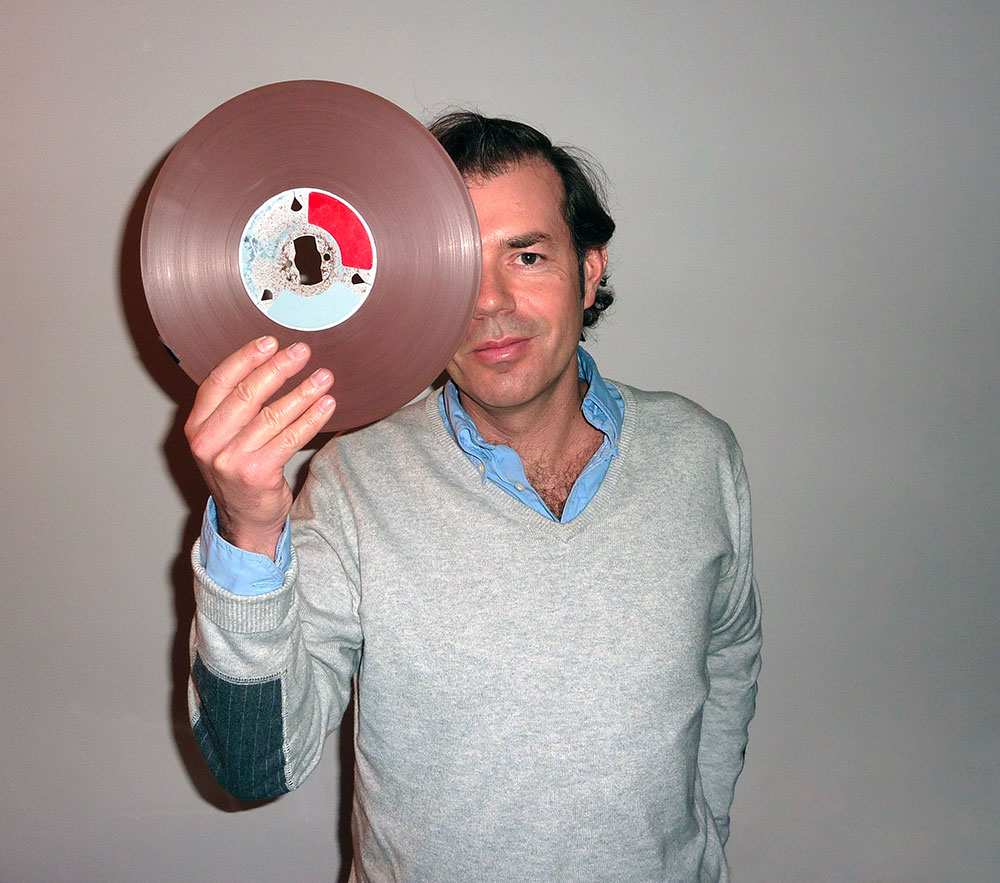
A specialist in music in cinema, Stéphane Lerouge is the creator of the Ecoutez le cinéma! for Universal Music France (200 volumes since 2000), lecturer at the University of Paris I (1993-2005), music programmer for the Festival Musique et Cinéma d’Auxerre (2000-2008), author of L’Alphabet des musiques de films (Gallimard, 2000), Conversations avec Antoine Duhamel (Textuel, 2007) and co-author of Michel Legrand’s memoirs, J’ai le regret de vous dire oui (Fayard, 2018). In 2016-17, he collaborated with Bertrand Tavernier on the musical part of the documentary Voyage à travers le cinéma français. He leads meetings at the Cinémathèque Française, Forum des Images, Festival de Cannes, Festival Lumière, elaborates the film music part of the Musée Sacem and, in summer 2023, co-hosts the program Balades originales on France Musique.
